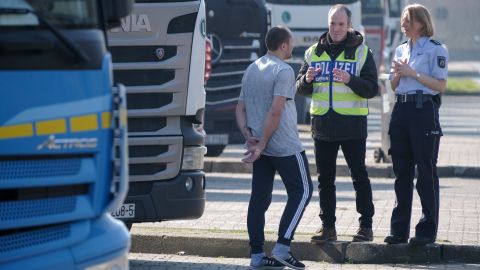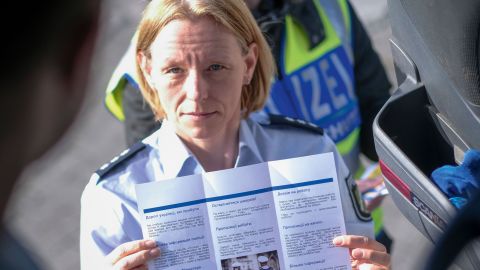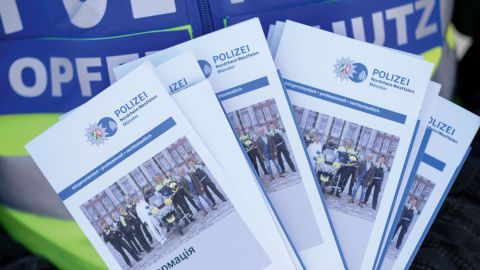The Settel parking lot on the A1 freeway is popular and well-known among truck drivers from all over Europe. "Rest area A1/E37 Settel is located at the town of Lengerich in Germany. You can park your truck in the parking area as a stopover," says the long-distance driver portal app.truckparkingeurope.com. Martina Habeck and Markus Piotti know exactly where they have to stop off this morning. The two are members of the traffic accident prevention team at Münster police headquarters and are on the road to help truck drivers from the war-torn countries of Ukraine and Russia, as well as from the deployment area of Belarus. Because there are thousands of them on Europe's freeways.
A truck with Ukrainian license plates is parked in the Settel parking lot. The curtains are drawn, sleeping cabin. "We didn't even dare knock at first. But then we thought, if you want to offer help, you can always interrupt," reports Martina Habeck. Sure enough, the passenger door opens. A 50-year-old trucker is sitting in front of them, his head in both hands, his wet eyes looking at the two uniformed Germans for advice. "With our hands and feet, gestures, facial expressions and a few sentences in English, we were able to find out that the man was basically fine. He was simply very desperate. The war in his home country, the pictures he had seen here and the information from his family completely destroyed this tough guy," says the officer looking back. Ukrainian truck drivers are tough guys.
After the admittedly difficult conversation with the Ukrainian trucker, the Münster team leaves with a good feeling and the hope: "We can now leave the man alone, perhaps we have been able to take away some of his fear and loneliness."
The Münster team had many such encounters that day. And many very positive reactions to the visit from the police in their cabins, who do not want to check tachographs but offer help. However, assisting long-distance drivers at highway rest areas is not really one of their actual areas of responsibility. The police chief inspector is responsible for prevention on the federal highways at the Accident Prevention/Victim Protection Department (VUP/O). She is also one of four victim protection officers and, together with government employee and social education worker Markus Piotti, forms an interdisciplinary team in victim protection.
So how did this special and challenging task come about?
Brief review. Friday morning, early meeting at the VUP/O office of Münster police headquarters. Normally, head of department Marc Belusa schedules cycling training, pedestrian driving licenses, the NRW crash course and other traffic prevention activities here. But on this morning, he looks into the sad faces of his colleagues. It is February 25th. The day on which Putin's troops fired 200 missiles at the sovereign neighboring state of Ukraine and armored units crossed the border. "We have to do something, we have to help somehow!" one of the colleagues interrupts the silence. A lively brainstorming session begins, many ideas buzz around the room. Everyone is clear: the motto "The police, your friend and helper" should be filled with life.
How is quickly clear. "Around Christmas, we set up a helpline for truck drivers. As we were unable to organize a regulars' table for long-distance drivers due to the coronavirus, this hotline was intended to provide advice and support to drivers far away from their families," explains Martina Habeck. It is precisely this helpline that is now being used again. "It was clear to us that we as the police cannot offer a solution for all problems," explains Piotti. "That's why we contacted the city of Münster and various aid organizations directly so that we had a broad network behind us." As a result, the helpline was staffed by road safety advisors from the police, social workers and a Russian interpreter. Before joining the police, Piotti himself worked for many years as a social worker for a charitable organization and was responsible for crisis intervention and company social work in a private company, among other things.
"We were prepared for anything: Ukrainian and Russian drivers who are worried about the death of their loved ones. Drivers who are afraid to return home because they could be drafted into the military and have to go to the front. Drivers who can no longer use their cell phones because the network operators have switched off their services. Drivers who can no longer get anywhere because the fuel card can no longer be used or the truck has a technical problem, but the company back home can no longer be reached. Drivers without food because they have run out of cash and their bank accounts have been blocked." Piotti lists many scenarios. "Of course, there could also be clashes between Russian and Ukrainian truckers at the rest areas," adds Habeck. "We have therefore contacted our colleagues at the freeway police stations directly to ensure that they are particularly vigilant in this regard when carrying out their checks."
So now the hotline. In addition, a flyer is being designed for Ukrainian, Russian and Belarusian truck drivers so that they know about the support options. The simultaneous distribution via Facebook receives a huge response. A few days later, almost 60,000 people had already been reached via social media.
"We drove through almost all of the rest stops, filling stations and parking lots," explains Habeck. They meet two young men from Belarus in their driver's cab. They no longer need the flyer. They smile and hold out a printout from Facebook to Habeck and Piotti. What do they see? Their own photos with the number of the helpline. "We were really happy," beams Habeck.
The helpline was contacted by many volunteers who wanted to help. Like a man who wanted to pick up Ukrainians in his bus at the rest areas free of charge. Or a woman who offered to bring food to the rest areas on the highways. Nora Tomsik and her colleague Daniel Dertenkötter from the Recklinghausen highway police station also provided help. The two police inspectors guided a minibus belonging to a Ukrainian family to the nearest parking area on the A43 after a flat tire at the Recklinghausen junction. Exactly where their station is located. Naturally, the repair was organized. There was fresh coffee for the adults. And Nora Tomsik had a very special gift for the children: a teddy bear.



